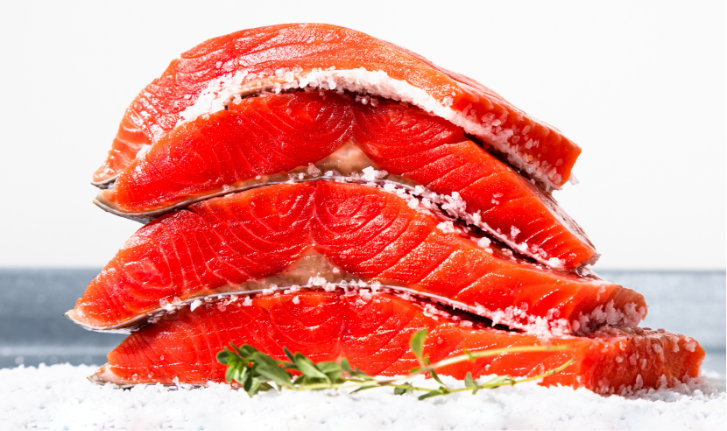Is Smoked Salmon Good for You?
Fish can be one of the most flavorful and nutritious foods, especially when it's fresh and cooked from scratch. Whether it’s grilled, baked, or sautéed, fresh fish offers a delicate, natural flavor that is rich in omega-3 fatty acids, protein, and essential nutrients!
However, when it comes to smoked salmon, some people may wonder how this preserved version compares to fresh fish. Smoked salmon has a unique flavor that is loved by many, but the smoking and preservation process can raise questions.
Is smoked salmon healthy? Here’s what you need to know.
What is Smoked Salmon?
Smoked salmon is a popular seafood made from salmon that is first cured and then smoked. To cure the fish, it is rubbed with a mix of salt and sugar. This helps preserve the salmon and improve its flavor. After curing, the salmon is smoked using either hot or cold methods.
In cold smoking, the salmon is smoked at a low temperature (around 70-90°F or 21-32°C) for several hours or days. This method gives the salmon a delicate smoky flavor while keeping it mostly raw. Cold-smoked salmon, also known as "lox," is often used in dishes like bagels with cream cheese.
In hot smoking, the salmon is smoked at a higher temperature (around 120-180°F or 49-82°C) for a shorter time. This method cooks the fish and gives it a firmer texture and a stronger smoky flavor. Hot-smoked salmon can be eaten alone or used in recipes like salads and pasta.
Smoked salmon is cherished for its rich flavor, silky texture, and versatility. It’s no surprise that it’s a popular choice as an appetizer or a gourmet topping for salads, bagels, and a variety of other dishes.
Related: Is Smoked Salmon Cooked or Raw?
Is Smoked Salmon Good for You?
Smoked salmon can be good for you as it is rich in nutrients your body needs for different purposes. However, certain factors, including how it's prepared and how much you eat should also be taken into consideration.
Healthy Benefits of Smoked Salmon
While its savory flavor may be what draws people in, smoked salmon provides a wealth of nutrients with the following benefits:
- Rich in omega-3 fatty acids. Smoked salmon is an excellent source of omega-3 fatty acids, which are beneficial for lowering triglycerides, improving brain function, and reducing inflammation.
- High in protein. It's a good source of high-quality protein, which is essential for muscle repair, immune function, and curbing hunger.
- Rich in vitamins and minerals. Smoked salmon provides important vitamins and minerals, including vitamin D, vitamin B12, selenium, and potassium.
Considerations with Smoked Salmon
The high sodium levels in smoked salmon may be a concern for individuals who are trying to reduce their salt intake. Other considerations include the use of additives and mercury levels. Let’s discuss each below:
- Sodium content. The curing process for smoked salmon involves salt, which can make it high in sodium. Consuming too much sodium can contribute to high blood pressure and other health issues, so it's best to enjoy smoked salmon in moderation.
- Preservatives. Some commercially produced smoked salmon may contain preservatives or additives. Opting for products with fewer additives or those labeled as "natural" can be a healthier choice.
- Mercury levels. Like other types of fish, salmon can contain trace amounts of mercury. While salmon generally has lower mercury levels compared to larger fish, it's still good to balance your diet with a variety of fish and other protein sources.
Is Smoked Salmon as Healthy as Fresh Salmon?
Smoked salmon and fresh salmon both have health benefits, but they differ in some ways. They are packed with omega-3 fatty acids, high-quality protein, and essential vitamins and minerals. However, the added salt in smoked salmon may not be ideal for those watching their salt intake.
Moreover, smoked salmon can pose a risk of listeriosis, a foodborne illness caused by the bacterium Listeria monocytogenes. This risk is particularly significant for pregnant women, the elderly, and those with weakened immune systems.
Listeria can survive and grow at refrigerator temperatures, which makes smoked salmon a potential source of infection if it is not handled or stored properly.
Who Should Avoid Smoked Salmon?
People on low-sodium diets should stay away from it due to its high sodium content, which can increase the risk of high blood pressure. Those with kidney disease or heart conditions should also avoid smoked salmon, as too much sodium can make these issues worse.
Pregnant women should be careful with cold-smoked salmon because it carries a risk of listeria, a bacteria that can harm both the mother and the baby.
Summary
As you’ve learned, smoked salmon can be a delicious and nutritious addition to your diet. However, it’s important to enjoy it in moderation, considering factors like sodium content and the risk of listeriosis.
For those who want to ensure the highest quality and freshness, consider choosing products from reputable sources. At Alaskan Salmon Company, we offer Wild-Caught Copper River Sockeye Salmon.
Whether you’re a fan of smoked salmon or prefer fresh, our salmon is a fantastic choice for anyone seeking top-notch seafood.

